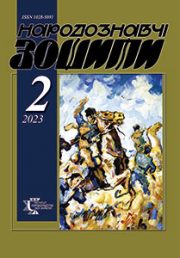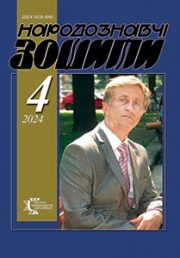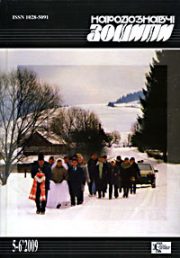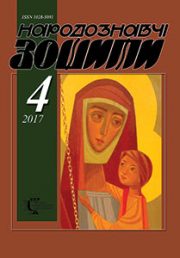The Ethnology Notebooks. 2021. № 4 (160), 831—839
UDK638.1(477)(092)Боровський М.”1891-1989″
DOI https://doi.org/10.15407/nz2021.04.831
MOVNA Ulyana
- Doctor of Sciences of History, Senior Researcher
- of the Institute of Ethnology of the National Academy
- of Sciences of Ukraine,
- in the Department of Historical Ethnology,
- Svobody Avenue 15, 79000, Lviv, Ukraine
- Contacts: e-mail: movlana@ukr.net
Abstract. Mykhailo Borovsky, an agronomist-engineer, theoretician and propagandist of beekeeping, organizer of the beekeeping cooperative movement, scientist, botanical terminology specialist, pedagogue, editor, is one of the cohort of Ukrainian public figures whose science, as well as beekeeping and cooperative practice, to the extent of their strength and capabilities approached the independence of Ukraine. His creative legacy includes 19 monographs and more than 200 brochures and articles.
The article outlines the life and creative path of the famous Ukrainian beekeeper and public figure of Mykhailo Borovsky (1891—1989), who with his tireless work approached the onset of the independent Ukrainian state. Particular attention is paid to the Lviv period of his creative, scientific, pedagogical and public activities, which lasted from 1927 to 1939 and proved to be surprisingly fruitful.
There are practically no special studies of the polyhedral figure of M. Borovsky in Ukraine, which determines the relevance of this investigation. The object of the research is actually the figure of M. Borovsky, and the subject — his scientific and practical activities aimed at creating development of agronomic science, a modern Ukrainian beekeeping and consolidation of the beekeeping community. The article uses a comparative method, the method of historical reconstruction, the method of biographical studies.
Кeywords: Mykhailo Borovsky, beekeeping, apiary cooperation, Beekeeping section of the company «Silskyi Hospodar», agronomy, natural science, Ukrainian.
Received 9.08.2021
REFERENCES
- Rozgin, I. (1962). M.L. Borovsky. Biobibliographic essay on life, public and scientific work on the occasion of the 70-th anniversary. Toronto [in Ukrainian].
- Marunchak, M. (1986). Biographical guide to the history of Ukrainians in Canada (Pp. 78—79). Winnipeg [in Ukrainian].
- (1961). Anniversary of the head of IDV M. Borovsky. Chronicle of Volyn, 5, 151—153 [in Ukrainian].
- Narizhny, S. (1942). Ukrainian emigration: cultural work of Ukrainian emigration between the two world wars [in Ukrainian].
- Central State Historical Archive of Ukraine in Lviv. F. 302. Op. 1. Act. 740 [in Ukrainian].
- Borovsky, M. (1974). Essay on the history of agricultural schooling in western Ukraine 1900—1944. Winnipeg [in Ukrainian].
- Borovsky, M. (1970). Beekeeping cooperation and its cooperation with TV «Silsky Hospodar». Regional Business Association «Silsky Hospodar» in Lviv. 1899—1944 (Pp. 552—557). New York [in Ukrainian].
- (1928). Meeting of the Supervisory Board and the Board of «Riy». Ukrainian Beekeeper, 5, 66 [in Ukrainian].
- (1928). Industrial apiary of TV «Riy» in Lviv. Ukrainian Beekeeper, 2, 20 [in Ukrainian].
- (1929). News from the edge. General meeting of the coop. «Riy» in Lviv. Farmer, 4, 60 [in Ukrainian].
- Borovsky, M. (Ed.). (1938). Beekeeper’s friend. Calendar-notebook for Ukrainian beekeepers for 1939. Lviv [in Ukrainian].
- Movna, U. (2010). Activities of the first Ukrainian beekeeping cooperative «Riy» (Lviv; Kholm, 1926—1944) (According to periodicals). Collection of works of the Research Center of Periodicals (Issue 2 (18), pp. 266—278) [in Ukrainian].
- Central State Historical Archive of Ukraine in Lviv. F. 302. Op. 1. Act. 105 [in Ukrainian].
- Movna, U. (2008). From the history of the beekeeping section of the Ukrainian regional society «Silsky Hospodar» in Lviv (to the 150-th anniversary of the birth of Yu. Dutkevych). Drohobych local lore collection (Issue 11—12, pp. 293—300) [in Ukrainian].
- Borovsky, M. (1970). Main Beekeeping Section of TV «Silsky Hospodar» Regional Business Association «Silsky Hospodar» in Lviv. 1899—1944 (Pp. 174—185). New York [in Ukrainian].
- Fur, I. (1989). Ukrainian cooperation in the Kholm region during the German occupation, 1939—1944. Nadbuzhanshchyna. Sokal, Belz, Radekhiv, Kaminech, Kholm and Podlasie. Historical and memoir collection (Vol. 2. pp. 681—697).New York; Paris; Sydney; Toronto [in Ukrainian].
- (1942). Regional beekeeping cooperative «Rij» in Kholm. Ukrainian beekeeper, 1, 13 [in Ukrainian].







